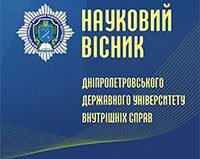Vlada LITOSHKO, Karine MKRTCHIAN
LITOSHKO V., MKRTCHIAN K. (2022), THEORETICAL AND LEGAL ASPECTS OF THE BASIS OF COOPERATION OF STATES IN COMBATING OFFENSES IN THE SPHERE OF INFORMATION TECHNOLOGIES; Scientific Bulletin of Dnipropetrovsk State University of Internal Affair, Special Issue №2, 542-547
DOI: 10.31733/2078-3566-2022-6-542-547
ABSTRACT. Offenses in the field of information technologies pose a real threat to social relations at the domestic level and the international legal order. Organized criminal groups use new technological means for illegal purposes, causing harm to individuals and legal entities. The specified torts are distinguished by a high degree of latency and in many cases acquire a transnational character, which causes difficulties in their disclosure, bringing the guilty persons to justice, and also actualizes the need to consolidate the efforts of competent authorities of states around the world. The problem of combating offenses in the field of information technologies has been repeatedly considered in the documents of regional international organizations and the United Nations. It should also be noted that cooperation in the field under study is defined as one of the strategic conditions contributing to the achievement of goals in the field of sustainable development.
Since each regional legal regime is unique and has its own characteristics, the article considers the possible consequences of such regionalization. Based on the conducted research, the author concludes that the regionalization of international legal cooperation in the fight against cybercrime has its positive and negative sides and has led to a situation that can be partially explained by the transnational nature of offenses in this area. On the one hand, a regional agreement is the best way to solve a problem within a certain region. On the other hand, different approaches to the legality of actions carried out on the Internet or with the use of computer technologies can hinder mutual legal assistance or extradition between countries belonging to different regions.
Thus, taking into account the importance of cooperation in combating offenses in the field of information technologies, the fragmentation and disparity of the provisions of regional treaties, it is urgent for states to develop coordinated approaches and conclude a corresponding international treaty under the auspices of the United Nations. Regional international legal regulation, in turn, is characterized by fragmentation and diversity.
Keywords: combating offences, international cooperation, information technology offences, information security, cyber security.
- References:
- Chang, J. 10 Cybersecurity Trends for 2022/2023: Latest Predictions You Should Know – Financesonline. URL: https://financesonline.com/cybersecurity-trends/.
- Appazov, A. Legal Aspects of Cybersecurity. Faculty of Law University of Copenhagen, 2020. 70 p. URL : https://www.justitsministeriet.dk/sites/default/files/media/Arbejdsomraader/Forskning/ Forskningspuljen/Legal_Aspects_of_Cybersecurity.pdf.
- Kremer, J.-F., Müller B. Cyberspace and international relations: Theory, prospects and challenges. 2014. URL : https://doi.org/10.1007/978-3-642-37481-4.
- Konventsiia pro kiberzlochynnist [Convention on cybercrime] : Konventsiia Rady Yevropy vid 23.11.2001 r. : stanom na 7 veres. 2005 r. URL : https://zakon.rada.gov.ua/laws/show/ 994_575#Text [in Ukr.].
- Arab Convention on Combating Information Technology Offences of 21.12.2010. URL : https://www.asianlaws.org/gcld/cyberlawdb/GCC/Arab%20Convention%20on%20Combating%20Inform ation%20Technology%20Offences.pdf.
- African Union Convention on Cyber Security and Personal Data Protection : of 27.06.2014. URL: https://au.int/en/treaties/african-union-convention-cyber-security-and-personal-data-protection.
- Konventsiia Orhanizatsii Obiednanykh Natsii proty transnatsionalnoi orhanizovanoi zlochynnosti [United Nations Convention against Transnational Organized Crime] : Konventsiia Orh. Obiedn. Natsii vid 15.11.2000 r. : stanom na 4 liut. 2004 r. URL : https://zakon.rada.gov.ua/laws/show/995_789#Text. [in Ukr.].
- Fakultatyvnyi protokol do Konventsii pro prava dytyny shchodo torhivli ditmy, dytiachoi prostytutsii i dytiachoi pornohrafii [Optional protocol to the Convention on the Rights of the Child on child trafficking, child prostitution and child pornography] : Protokol Orh. Obiedn. Natsii vid 01.01.2000 : stanom na 3 kvit. 2003 r. URL : https://zakon.rada.gov.ua/laws/show/995_b09#Text. [in Ukr.].
- Report of the Eleventh United Nations Congress on Crime Prevention and Criminal Justice : of 25.04.2005. URL : https://www.unodc.org/documents/congress/Documentation/11Congress/ ACONF203_18_e_V0584409.pdf.
- Guidance Notes. Cybercrime. URL: https://www.coe.int/en/web/cybercrime/guidance notes.
- Council of Europe. Cybercrime: Towards a Protocol on evidence in the cloud. URL : https://www.coe.int/en/web/cybercrime/-/cybercrime-towards-a-protocol-on-evidence-in-the-cloud.
